| Go directly to the video section. |
Stills |
| PA-112993lg.jpg |
Convoy in Bedford Basin, Halifax, April 1,1942.
National Archives of Canada, PA-112993. |
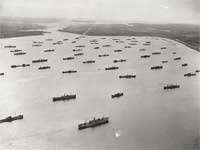 |
|
| PA-139273lrg.jpg |
ASDIC operators.
Photo by William H. Pugsley. National Archives of Canada, PA-139273. |
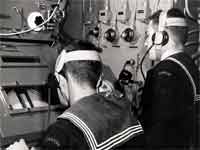 |
|
| 19470003-008-extlrg.jpg |
Enigma encryption device.
Canadian War Museum, 19470003-008.
|
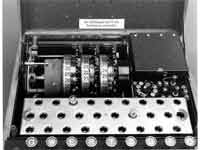 |
|
| pa-141316lg.jpg |
Survivors of the torpedoed minesweeper H.M.C.S. CLAYOQUOT rescued by H.M.C.S. FENNEL near Halifax, 24 December 1944.
Photo by Ernest Campbell. Department of National Defence / National Archives of Canada / PA-141316. |
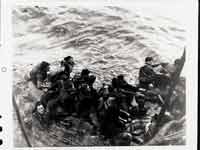 |
|
| PA-037443lrg.jpg |
German U-boat U-210 seen from HMCS Assiniboine, 6 August 1942.
Photo by G.E. Salter. Department of National Defence / National Archives of Canada, PA-037443. |
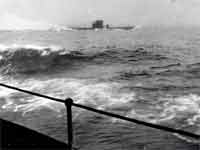 |
|
| PA-139292lg.jpg |
Crew watching film in mess deck of RCN ship. By 1942 the Volunteer Reserve made up for the majority of the RCN's personnel.
Photo by William H. Pugsley. Department of National Defence / National Archives of Canada, PA-139292 |
 |
|
| PA-134333lg.jpg |
U-889 surrendering to the Royal Canadian Navy off Shelburne, Nova Scotia, in May 1945.
Photo by R.G. Arless. Department of National Defence / National Archives of Canada, PA-134333. |
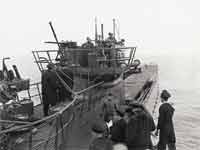 |
|
| PA-139292lg.jpg |
A sheet of sea water splashes over a crew member on HMCS Trillium, September 1943.
Photo by Jacques Trépanier. Department of National Defence / National Archives of Canada, PA-037474. |
 |
|
| at_still_01.jpg |
|
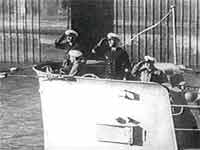 |
|
| at_still_02.jpg |
|
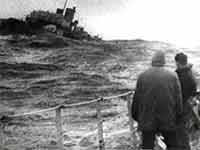 |
|
| at_still_04.jpg |
Merchant ship covered in ice on its way to Russia. For more information see about arctic convoys during WWII. |
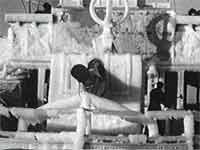 |
|
| at_still_04a.jpg |
Vessel coated with ice on the trip to Russia. |
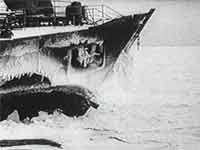 |
|
| type_11_u_boat.jpg |
|
 |
|
| 11148_minesweeper_1220.jpg |
View of Minesweeper, HMS Qualicum, [ca. 1945]
Gordon W. Powley
Black and white negative
Reference Code: C 5-1-0-71-1
Archives of Ontario, I0011148 |
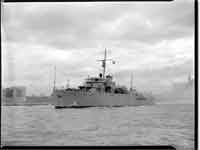 |
|
| PA-112359lg.jpg |
Tribal class destroyer HMCS Haida, 4 July 1944. Built at Newcastle-on-Tyne, England and commissioned 30 August 1943.
Photo by Gilbert A. Milne. Department of National Defence / National Archives of Canada, PA-112359.
|
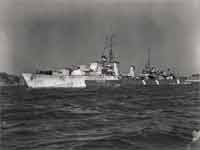 |
|
| PA-105255lg.jpg |
Corvette HMCS Chambly in Halifax, April 1941. Commissioned at Quebec City 18 December 1940, Chambly participated in escort missions and trained other corvettes for the duration of the war.
Department of National Defence / National Archives of Canada, PA-105255. |
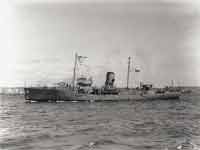
|
|
| PA-136925lg.jpg |
On 23 October 1944, four days after being commissioned in Kingston, revised Flower class corvette HMCS Belleville pays a visit to her namesake city. The RCN encourages such courtesy calls to foster patriotic feelings in the population.
Photo by Richard G. Arless. Department of National Defence / National Archives of Canada, PA-136925. |
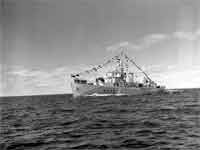 |
|
| PA-125863lg.jpg |
Commissioned at Vancouver April 2,1942, HMCS Caraquet was built for the Royal Navy and transferred to the RCN. Caraquet served on the West Coast from May 1942 to March 1943, on the East Coast from May 1943 to February 1944 and on the English Channel for invasion duties.
National Archives of Canada, PA-125863. |
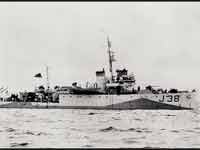 |
|
| PA-178962lrg.jpg |
German contact mine in waters off Nova Scotia, 2 June 1943.
Photo by H.H. Black. Department of National Defence / National Archives of Canada, PA-178962. |
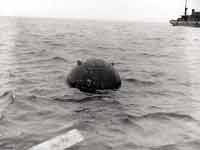
|
|
| PA-134522lg.jpg |
Frigate HMCS Chebogue on 17 March 1944, shortly after commissioning at Esquimalt, British Columbia. Chebogue was assigned to Escort Group C-1 in June 1944, after working up in Bermuda.
Photo by Kenneth Maclean. Department of National Defence / National Archives of Canada, PA-134522 |
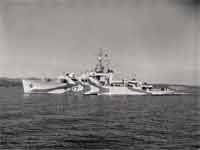 |
|
| PA-141300lg.jpg |
HMCS Chebogue was torpedoed by U-1227 on 4 October 1944 while on escort duty to convoy ONS-33. She was towed to harbour in Wales, yet her short career is over. |
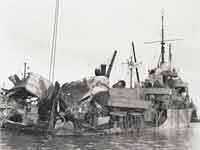 |
|
| PA-134191lg.jpg |
Fairmile motor launchQ084, May 1943.
Photo by Gilbert A. Milne. Department of National Defence / National Archives of Canada, PA-134191. Photo by Franklin Roy Kemp. Department of National Defence / National Archives of Canada, PA-141300. |
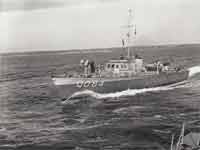 |
|
| PA-144573lrg.jpg |
G class MTB 466, 29th Flottilla
National Archives of Canada, PA-144537. |
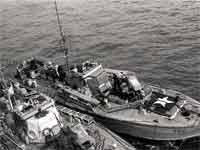 |
|
| PA-141525lg.jpg |
LCA 1050 leaving side of HMCS Prince David, loaded with soldiers of the Régiment de la Chaudière, 9 May 1944.
Photo by R.G. Arless. Department of National Defence / National Archives of Canada, PA-141525. |
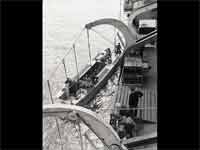 |
|
| PA-136986lg.jpg |
LCI(L) 299 of the 2nd Canadian Flotilla carrying personnel of the 9th Canadian Infantry Brigade to the Normandy beaches on D-Day.
Photo by Gilbert A. Milne. Department of National Defence / National Archives of Canada, PA-136986. |
 |
|
| PA-147981lg.jpg |
At anchor, unloaded SS Elk Island Park awaits loading orders. Delivered 6 June 1943 by Montreal-based United Shipyards, she is equipped with torpedo nests secured to booms stowed vertically against the mainmast.
Department of National Defence / National Archives of Canada, PA-147981. |
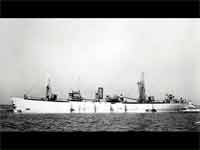 |
|
| Go back to the Stills section |
Video |
| at_001.mpg |
A ship is bombed on the horizon. |
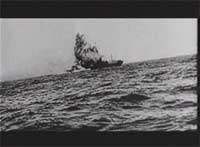 |
6 sec |


























